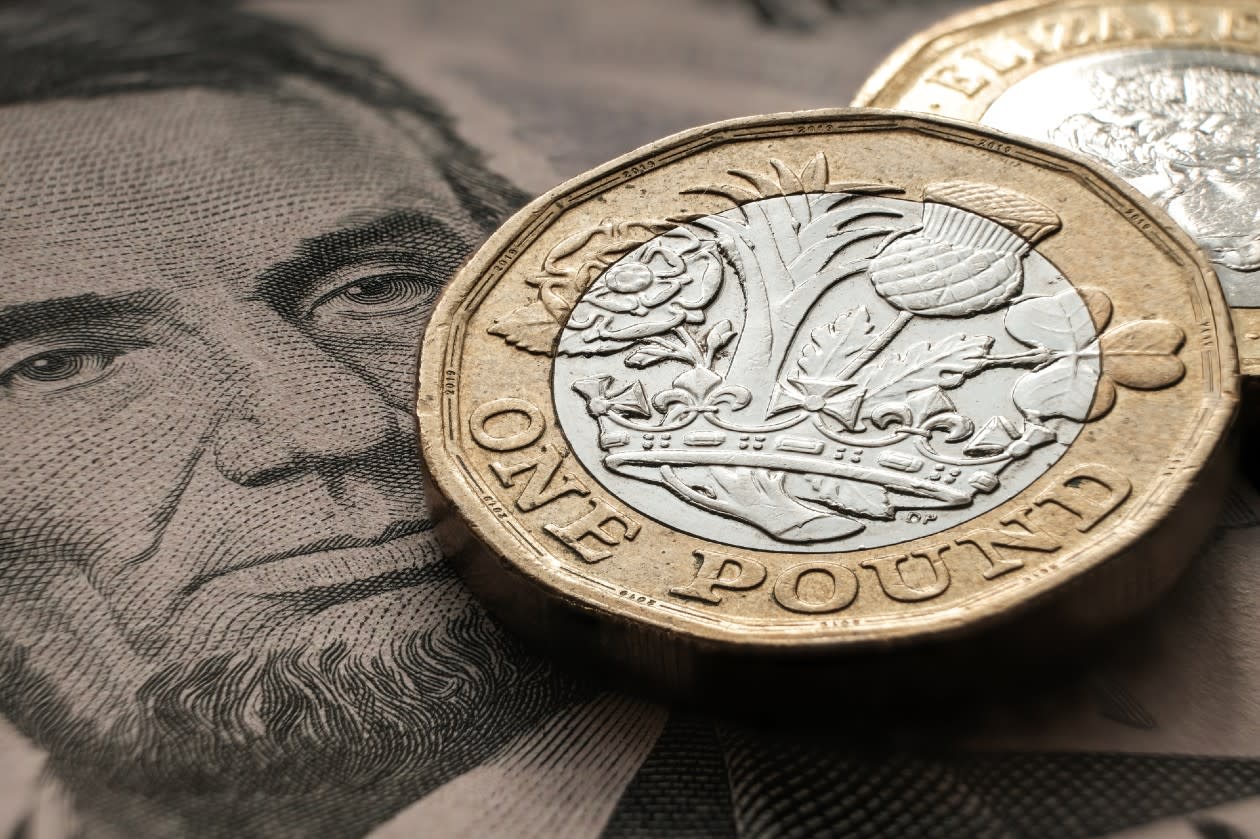It might not always appear obvious, but if you invest in stocks then it’s not only corporate updates that could impact your how your portfolio does – it’s also the foreign exchange (FX) market.
Firstly, if you invest in overseas stocks that issue dividends, converting those into your local currency leaves you exposed to the FX market.
Added to that, global companies can see their profits fluctuate based on currency movements.
FX is also a consideration if you invest in UK stocks, since you could have indirect exposure to global currency risk.
The FTSE 100, for example, has a heavy influence of foreign earnings. That’s because over 80% of FTSE 100 earnings come from overseas.
For the FTSE 250 it’s more than 50%.
This means that when the pound goes up and down, it can have an impact the earnings reports for UK companies.
A stronger pound can weigh on foreign earnings, as they’re worth less when converted to pounds, while a weak pound can boost the value of foreign earnings.
This article isn’t personal advice. Remember, investments and any income from them can rise and fall in value, so you could get back less than you invest. Yields are variable and past performance isn’t a guide to the future. If you’re not sure if an investment’s right for you, ask for financial advice.
Why is the US dollar soaring?
The currency market has had a blistering start to 2025, and the US dollar, considered to be the world’s reserve currency, has seen a sharp move higher.
There’s been an almost relentless increase in the US dollar in recent months, and the dollar index, which measures the US dollar’s performance versus a basket of currencies, has surged to its highest level since 2022 in recent weeks.
There are a number of reasons why the dollar’s been soaring.
The first is the theme of US economic exceptionalism. The US economy is expected to have grown by 2.76% in 2024 and by 2.15% this year, according to the International Monetary Fund (IMF).
This compares with a growth rate of 1% for the UK in 2024 and 1.4% in 2025. In France, GDP is expected to expand by 1% this year. In Germany, growth is expected to be flat in 2024, and to pick up only slightly to 0.7% in 2025.
This mean the US is growing at twice the rate of other major economies and in the FX market, robust growth can be currency positive.
The bond market is also an important factor for the FX market.
Growth and inflation can impact the bond market. For example, when growth is strong, this can put upward pressure on inflation.
We’ve seen this in the US – GDP is expected to expand by 2.7% in 2024, and as the US economy has strengthened, inflation has also risen.
Annual inflation has been above the Federal Reserve’s (Fed) 2% target rate for nearly three years and in recent months it’s ticked higher.
Decent growth rates and inflation that’s above target is reducing market-based expectations for interest rate cuts in the US.
This is pushing bond prices down, but US bond yields up – the 10-year Treasury yield was recently at its highest rate since October 2023. Right now, US yields are rising because of a strong growth outlook which is boosting the desirability of the dollar.
What drives the FX market?
The connection between inflation, growth and interest rates all impact exchange rates, and no one economic indicator is more important than another.
Sometimes, low interest rates increase the attractiveness of a currency because they can boost economic growth. Likewise, growth can be an attractive feature of a currency, until that gets overtaken by inflation concerns and higher interest rates.
There are also other drivers of currency markets, which can have big implications for the FX market, for example, political stability and how much debt a country has.
The IMF might expect the UK economy to grow at a faster rate than Germany in 2025. However, Germany’s budget deficit is expected to be significantly lower than the UK’s, with the IMF expecting Germany’s deficit to fall to 1.7% of GDP in 2025, compared to 3.7% for the UK.
In the current environment, concerns about the UK’s debt levels are weighing on the pound.
Political stability, Donald Trump and ‘safe havens’
Political stability is also a concern for currency market.
New US President Donald Trump’s proposed economic policies is expected to trigger disruption for the global economy. It’s already impacted the Fed’s thinking about the future direction of US interest rates.

The minutes of the December Fed meeting stated that ‘all participants judged that uncertainty around the scope, timing and economic effects of potential changes in policies affecting foreign trade and immigration were elevated.’
The Fed is concerned about the impact of Trump’s policies, yet the US dollar is continuing to strengthen.
Added to this, the US has a huge debt load, and its budget deficit in the third quarter of 2024 was 6.24% of GDP.
So why is the dollar still strengthening?
The dollar is the world’s most traded currency. This helps the dollar to attract ‘safe-haven’ flows. So, even though Trump’s potential policies are causing some discomfort with Fed members, the dollar has continued to strengthen.
Why is the pound falling?
The outlook for the pound is not so rosy, after a bleak start to the New Year.
Sterling had been one of the best performers out of the G10 countries in 2024, second only to the US dollar. However, the pound has sunk to the bottom of the G10 pack in early January, and GBP/USD is approaching $1.20, and is at a 14-month low.
This is due to multiple factors, including concerns around the UK’s growth outlook as consumer and business confidence has tumbled in recent months.
Inflation is also above the Bank of England’s 2% target rate, and expectations for interest rate cuts have been scaled back, which could weigh further on growth.
UK bond yields have sold off sharply in recent months, and the 10-year UK Gilt yield is higher by 61 basis points, compared with a rise of 41 basis points for France and 32 basis points for Germany.
The weakness in the pound at the same time as bond yields are rising, is a sign of fiscal stress. It suggests that public sector debt levels are having a direct impact on the currency and UK bond yields.
That means, until public sector debt is under control, the pound might not stabilise.
Performance of the pound versus the dollar
What does this mean for stock market and investors?
While the FX market has experienced intense moves in recent months, this doesn’t have to be negative for your portfolio.
Some FTSE companies are less exposed to a falling pound because of the high proportion of foreign earnings – like the FTSE 100.
Added to this, investors in overseas stocks, especially US shares, could gain from a strong dollar.
So, if you invest in stocks, it’s always worth keeping an eye on global currency trends to understand what they could mean for your investments, and to help spot any potential opportunities.
However, currency ups and downs aren’t any reason to make big wholesale changes to your portfolio. As ever, the key to investing success is holding a diversified portfolio, which means being exposed to lots of different currencies, and investing for the long term.
Kathleen Brooks is the Founder of Minerva Analysis, a market analysis company. Hargreaves Lansdown may not share the views of the author.









